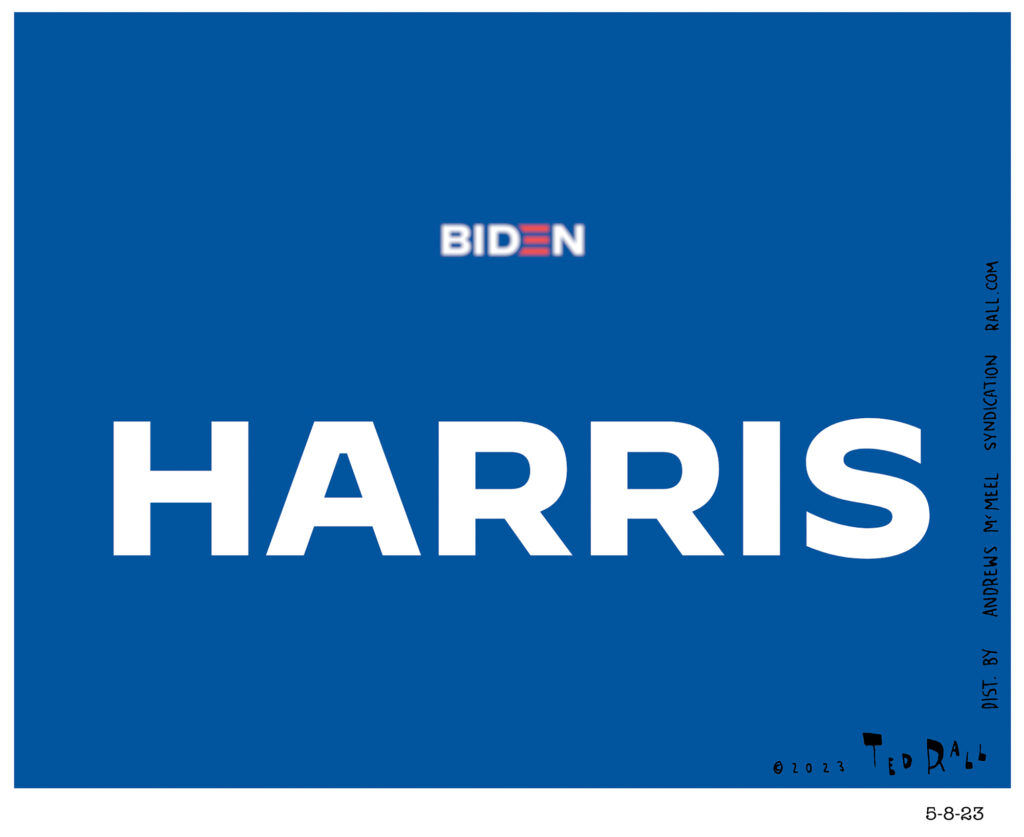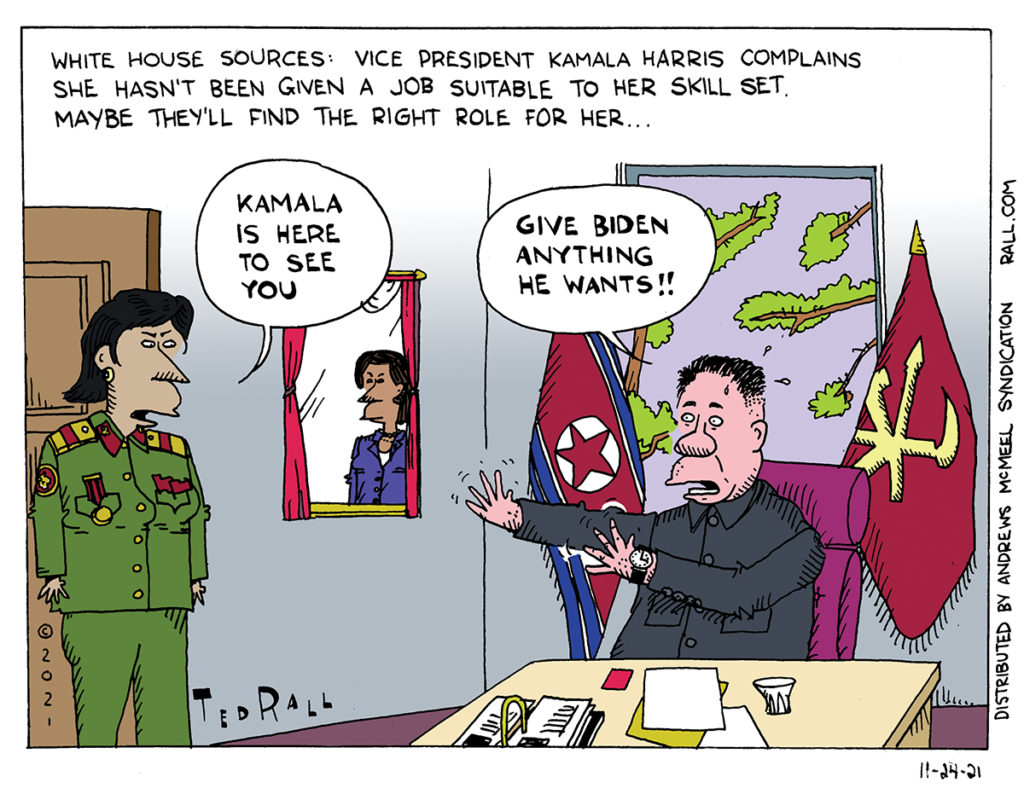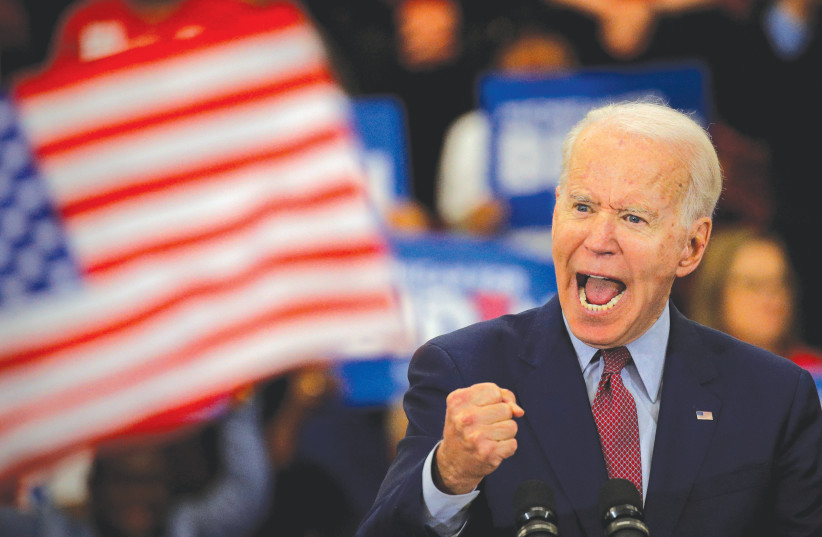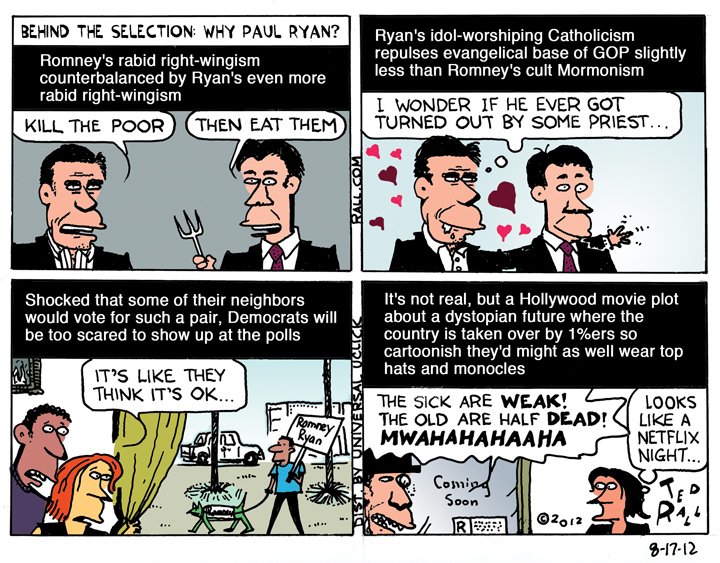The issue of President Biden’s age, unprecedented in American political history, will increasingly rise to the fore as voters focus on the election. The role of the vice president, of course, has never been more relevant.
Joe Biden’s Vice Presidential Pick is…ZZZZZ
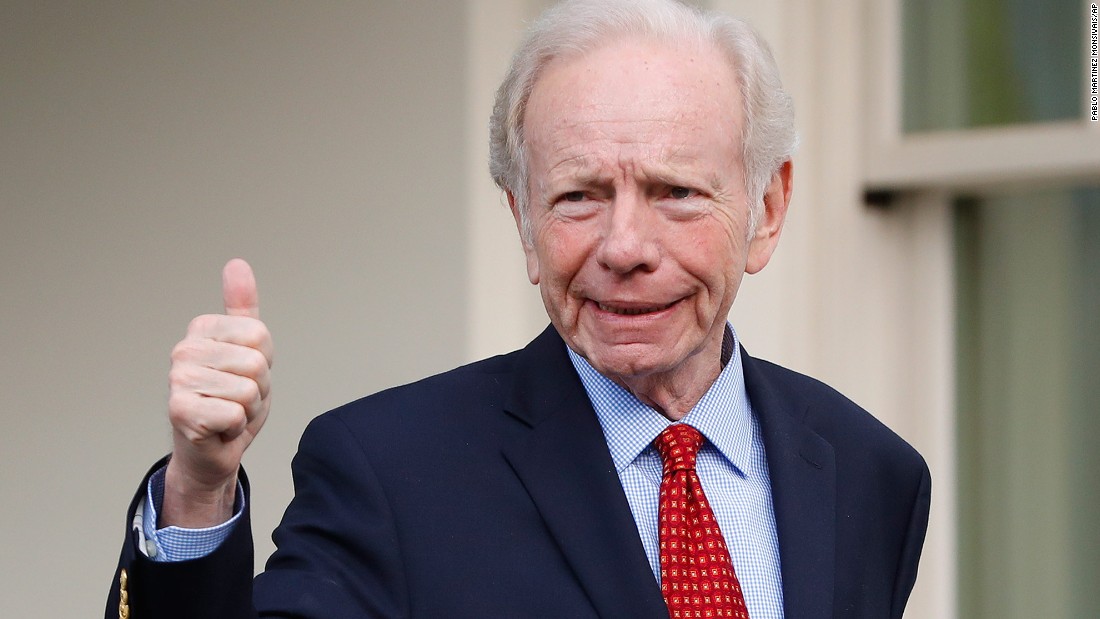
Added 6 pm Eastern 8/11/20: Well, that turned out to be true.
Most years, the Super Bowl is a dud. Yet the hype machine keeps pulling in new suckers.
The quadrennial announcement of the Democratic nomination for vice president features an identical Lucy, Charlie Brown and the football dynamic: lots of hype followed by deadly disappointment. And there’s never been more hype than this year.
Not that Joe Biden’s pick isn’t important. If he wins, he will be the oldest person to take the oath of office by a full eight years. (He’ll be 78. Trump, the second oldest, was 70 in 2017.) Even by the standards that the 70s are the new 60s, Joe Biden’s 70s look more like 80s or 90s. His choice has to satisfy several competing constituencies: women, Blacks, and the progressive voters he desperately needs to show up November 3rd instead of sitting on their hands as they did last time.
But past performance almost always being a reliable indicator of near-future returns, Democrats should prepare for a Super Bowl-like fiesta of deep disappointment.
Last cycle’s brutal primaries prompted speculation that Hillary Clinton might unify the party by giving Bernie Sanders the VP nod. She chose Tim Kaine. (Political pundits jammed phone and text messaging with: “who?”) She told Charlie Rose she loved that Kaine described himself as “too boring.”
Clinton thought Kaine’s dullness would provide balance. Voters considered it redundant. “‘Safe,’” observed Politico, “seems to be Kaine’s middle name.” In the year of Trump, safe was anything but.
That’s often the case.
I was traveling through Central Asia when a hotel employee informed me that Al Gore had announced that Connecticut senator Joe Lieberman would be his running mate to go up against Bush-Cheney in 2000. I assumed my Uzbek host was part of some weird post-Soviet gaslighting campaign. How could Gore do anything so stupid?
The mists of time and the Florida recount fiasco have blurred the fact that, like Clinton 16 years later, Gore needed a progressive to balance his record as a Third Way centrist. Inexplicably, both at the time and today, clueless Democratic pollsters somehow convinced themselves that what he really needed to do was distance himself from Bill Clinton—the president under whom he’d served for eight years and who was enjoying improving poll numbers. They also thought the conservative Lieberman’s “moral rectitude” in being the first Democrat to condemn Bill Clinton for the Monica Lewinsky scandal would appeal to left-leaning Ralph Nader voters.
Lieberman opposed affirmative action and gay marriage. He supported every major military intervention, including, at first, Vietnam.
Nader kept his progressive votes.
The first rule of picking a veep is do no harm. The second is to remember the lesson of Bill Clinton/Al Gore 1992, when Democrats won with a pair of centrists of similar age and temperament from neighboring states: geographical ticket balancing as an art peaked out when JFK tapped LBJ.
As tensions mount between voters dominated by the populist progressive left and party leaders who manipulate the Democrats’ primary process to favor corporate centrists like Obama, Clinton and Biden, however, the case for ideological balance seems stronger than ever. Surely Hillary Clinton must wake up in the middle of the night wondering if relegating Bernie Sanders to number 39 on her list of running mates was the best decision she ever made.
By that standard Elizabeth Warren ought to be keeping her phone by the window in her house with the best reception. She would be an interesting choice: both more intelligent and intellectual than her boss, white (OK, white and Native American) in the year of Black Lives Matter, someone disgruntled progressives would have a hard time justifying as the target of a voter boycott.
Of the women floating around on Biden’s supposed short list, Warren would surprise. She would exceed expectations. She might unify the party.
I don’t think she stands much of a chance.
Boring usually gets the nod.
(Ted Rall (Twitter: @tedrall), the political cartoonist, columnist and graphic novelist, is the author of the biography “Political Suicide: The Fight for the Soul of the Democratic Party.” You can support Ted’s hard-hitting political cartoons and columns and see his work first by sponsoring his work on Patreon.)
Progressives Decide: Dignity and Freedom, or Voting for Biden
Bernie Sanders is out of the race and with him goes the last chance for progressivism to take over the Democratic Party for a generation.
Now his supporters will decide what to do. Intransigent #BernieOrBusters will cast about for a third-party vote, write-in Bernie or sit out the election in November. Other left-leaning voters will hope against hope that Joe Biden will either pivot to the left himself or that Biden will appoint progressive-minded cabinet members, and maybe tap Elizabeth Warren as vice president, to run the country as he continues to fade into the dying of the light.
There is absolutely no reason to think that Joe Biden would appoint a single progressive to his cabinet or pick one as his vice president. Theoretically, of course, anything is possible. Biden could take up hang-gliding! But Biden hasn’t made the slightest hint that he would pick a progressive for any important position.
Biden has said that he would consider a Republican as his vice president. He has promised to choose a woman. He sends signals when he wants to. And none of those signals has ever been directed toward the left wing of the Democratic Party.
After he consolidated his delegate lead on Super Tuesday, Biden received a lot of media coverage for “reaching out” to Sanders’ supporters. But his message was worthless pabulum: “Let me say, especially to the young voters who have been inspired by Senator Sanders: I hear you. I know what is at stake. And I know what we have to do.”
What exactly does Biden “know” he has to “do”? Nothing that progressives want. Bernie Sanders voters care about issues: Medicare For All, student loan forgiveness, free college tuition. Three days after his “olive branch,” Biden said he would veto Medicare For All if it somehow crossed his desk as president.
In the middle of the COVID-19 pandemic, that’s some malarkey.
Yet many liberal voters are praying that Biden will do something to make himself palatable enough to allow them to vote for him against Donald Trump this fall. Like the victim of an abusive alcoholic parent or spouse, they will wallow in magical thinking and project good intentions upon a candidate who has given them no reason to think he has changed. Maybe dad isn’t drunk tonight. Maybe Biden is secretly liberal.
Victims of abusive relationships “don’t stay for the pain,” psychologist Craig Malkin observed in 2013. “Their desperate, often palpable hope, if you sit in the room with them, is that the abuse will go away. And they tend to block out all evidence to the contrary.”
Given the history of the last four or five decades, it’s hard to describe the relationship between progressive voters and the corporate leadership of the Democratic Party as anything better than abusive. From Jimmy Carter to Bill Clinton and Barack Obama, progressives have been expected to donate money and cast votes for candidates who repeatedly broke their promises to fight for the poor and working class and, as time passed, felt so confident that they could get away with acting like jerks that they didn’t even have to bother to promise anything at all beyond not being Republicans—even though often they voted along with the GOP and signed their ideas into law.
2016 marked the first time that progressives stood up for themselves and demanded a place at the table, in the form of Bernie Sanders. Like any typical abuser, the DNC got angry at their victims, blaming progressives when their decision to cheat Sanders out of the nomination in favor of Hillary Clinton caused a catastrophic defeat to Donald Trump. Now it has happened again.
Though pathetic, it is not surprising to see progressives playing the role of the naïve victim who prays for his abuser to come to his senses and make nice.
With Joe Biden, there’s even more reason than usual to believe that nothing good can come out of standing by him. The man he served as vice president, Barack Obama, elevated the use and abuse of Democratic progressives to a diabolical art. He ran on Hope and Change and ending the Iraq war, only to prolong Iraq and expand Afghanistan with the backing of a cabinet that didn’t include a single progressive, not even a token like Clinton Administration labor secretary Robert Reich. Obama’s signature achievement, the Affordable Care Act, was conceived of by the right-wing Heritage foundation.
If you’re figuring out whether to stay with the Democratic Party or quit them, there’s a simple way to decide: watch Biden. If he’s serious about picking a progressive as vice president or putting some of them into his cabinet, he will be willing to name names and do so soon. His silence on this topic—which is likely—probably means Vice President Kamala Harris or Amy Klobuchar and a bunch of Goldman Sachs wankers managing the economic crisis again.
Don’t be surprised if a lot of Democrats who have been let down by “their” party vote for it again this November. Abuse survivors “suffer from post-traumatic stress syndrome, one symptom of which is dissociation, which often creates such profound detachment from the reality of the abuse that sufferers scarcely remember being hurt at all,” Dr. Malkin wrote. “Dissociating victims can’t leave the abuse because they aren’t psychologically present enough to recall the pain of what happened.”
(Ted Rall (Twitter: @tedrall), the political cartoonist, columnist and graphic novelist, is the author of the biography “Bernie.” You can support Ted’s hard-hitting political cartoons and columns and see his work first by sponsoring his work on Patreon.)
If This is a Democracy, Why Don’t We Vote for the Vice President Too?
Let’s say you owned a house and needed extra cash to make ends meet, so you decided to rent two of your bedrooms. Would you agree to lease those rooms to two people, but under the condition that you could only meet and run a credit check on one of them? Would you allow an anonymous rando move into your second room, no questions asked, not even their name?
It’s an absurd question. No one would do that. Yet that’s exactly what the parties ask millions of voters to do in American presidential primaries.
Thanks to debates and news reports we’ve gotten to know Bernie Sanders, Elizabeth Warren, Joe Biden and the other presidential contenders pretty well. Democratic voters have the information they need to vote for their party standardbearer. But they have no idea who will represent their party for vice president.
We don’t even know what kind of veep the candidates would pick. Would Biden balance his centrism with a progressive, or someone younger like Pete Buttigieg? Would Sanders double down on progressivism by pairing up with Warren, or vice versa?
Since four out of ten vice presidents have become president, this is not an academic question. (I include those who ran for the presidency using the formidable springboard of incumbency and the name reconciliation it bestows.)
You might think no big deal, my choice for president will select a running mate with a similar temperament and ideological leanings. History shows that “balance,” i.e. contrast, is a common strategy. Bush, an affable moderate Republican, went with maniacal hardliner Dick Cheney—and by many accounts Cheney was the one in charge. The US (and Iraq!) lost a lot when Bush prevailed over Al Gore; whereas Gore was a staunch environmentalist and a thoughtful liberal, his running mate Joe Lieberman was a charmless Republican in sheep’s clothing. Whatever you thought of John McCain (in my case, not much) it would have been a tragic day for America had he croaked and been succeeded by the shallow imbecile Sarah Palin.
It is strange—nay, it is insane—that a self-declared democracy allows, effectively, 40% of its future leaders to be elected not by the voters but by one person, the presidential nominee of one party or, at most, by a half-dozen of his or her confidants.
Sometimes it works out. The assassination of William McKinley gave us Teddy Roosevelt, who set the standard for the contempt with which a president ought to treat big business. How long would we have awaited the Civil Rights Act had LBJ not been prematurely promoted? Still, this is not democracy.
It is time for the United States to require that candidates for president announce their veep picks at the same time they announce their intent to run. It’s truth in advertising.
Candidates’ terms don’t expire with them. If a president succumbs to an assassin’s bullet, a foreign drone or an aneurysm prior to the end of their four-year term, voters—primary voters—ought to have the right to know who would finish it out. Toward that end, they also ought to pre-announce their cabinet picks. Many cabinet positions are in the line of succession. And they can make a big difference. I would not have voted for Barack Obama if I had known he would appoint Goldman Sachs’ Timothy Geithner to run the Treasury Department.
Announcing veeps early enough for voters to take them into consideration before casting their primary ballots would deprive political conventions of their last remaining bit of drama, but lower TV ratings are a small price to pay compared to what is to be gained: transparency and choice.
It’s not like revealing the number-two spot ahead of time is a crazy idea no one has tried before.
“Nowadays, once a candidate has locked up the presidential nomination, we expect them to choose their running mate by whatever process they choose to employ, introduce him (or, in two recent cases, her) to the public a few days before the convention, and we all understand that the convention will rubber-stamp that choice, and the veep nominee will make a televised speech, which will occur on Wednesday night, the third day of the four-day TV show that conventions have become,” Eric Black wrote for the Minnesota Post.
“In the earliest days of the Republic—and this was the way the Framers of the Constitution intended it—whoever finished second in the Electoral College voting would become vice president. That’s how John Adams, the first vice president got the job. Even as the two-party system (which is not mandated by the Constitution) developed, that remained the case, which is how Adams (when he succeeded George Washington in 1796) ended up with his chief rival in the presidential race (Thomas Jefferson) as his vice president.”
The parties usurped the voters’ role in the choosing of the vice president in 1832.
We’re a weird country. Few electoral democracies elect a president the way we do and even fewer deal with succession the same way. Most nations replace their departed presidents with a temporary fix, typically an acting president who is a parliamentary official analogous to the Speaker of the House pending a special presidential election, or a quickie election to find a replacement. We’re pretty much on our own when it comes to figuring out a better construction.
What’s clear is that nothing would be lost and much would be gained by requiring presidential candidates to declare their running mates, and their cabinets, up front.
(Ted Rall (Twitter: @tedrall), the political cartoonist, columnist and graphic novelist, is the author of “Francis: The People’s Pope.” You can support Ted’s hard-hitting political cartoons and columns and see his work first by sponsoring his work on Patreon.)
SYNDICATED COLUMN: Handicapped
Conventional Wisdom Is Wrong. It’s Romney’s To Lose.
Catching Barack Obama in a rare moment of candor, an open mic found the president confiding to his Russian counterpart that he expects to win this fall. “This is my last election,” he told Russian President Dmitry Medvedev.
Last, yes. But I wouldn’t bet on Obama winning.
The corporate pundit class has largely conceded the general election to Obama, already looking ahead to 2016. The mainstreamers have their reasons. Their analysis is based on good, solid, reasonable (inside the box) logic. All things considered, however, I would (and have) put my money on Mitt Romney this fall.
This isn’t wishful thinking. I voted for Obama last time and wanted him to succeed. He failed. His accomplishments have been few and have amounted to sellouts to the right. Even so, the prospect of watching Mitt Romney move into the White House fills me with as much joy as an appointment for a colonoscopy. And I think he’s going to win.
For me, the D vs. R horserace is a parlor game with minor ramifications for our daily lives. Whichever corporate party wins, unemployment and underemployment will continue to worsen, income disparity will widen, and most of our taxes will fund the worst approach to international affairs since a former Austrian corporal blew out his brains out in a bunker under Berlin.
Thanks to the Occupy movement, real politics is back where it belongs—in the streets. That’s what I’ll be watching and working. With a lot of luck (and even more pepper spray) this will be a year of revolution rather than more electoral devolution.
Revolution is inevitable. But we don’t know when it’s coming. So the 2012 campaign may still matter. Besides, handicapping elections is a game I enjoy and am good at. During 17 years of syndication my pick to win has only lost once (for the 2004 Democratic nomination). So, on the off chance that you’re one of those who still cares about our husk of a democracy, who hangs on every meaningless development of a political process devoid of politics—or you’re just a betting person, here’s my thinking.
Barring an assassination or a scandal, Mitt Romney will be the Republican nominee.
Obama currently leads Romney by about four to five points. But that’s not nearly enough of a lead to carry him to November. History shows that Republican nominees steadily increase in popularity throughout the summer and fall of an election year.
In April 2004, for example, John Kerry led George W. Bush by eight points. But Swift Boating erased that lead, and then some.
In order to win, a successful Democratic nominee has to begin with a big margin. That early lead must be large enough to wind up in the black, after months of being whittled away, when the votes get counted in November. I can’t see Obama pulling far enough ahead soon.
Incumbency is a huge advantage. If the election were held tomorrow, Obama would prevail. But the election is not being held tomorrow. It’s being held in November.
By the time they head to the polls this fall, voters’ brains will be drowning in months of hundreds of millions of dollars of slick, demographically targeted, pro-Romney attack ads. Republican campaigns are more effective at this sort of thing, and as Newt Gingrich and Rick Santorum can attest, Romney’s consultants pull no punches. Obama’s current lead will be a faded memory.
Every political campaign comes down to a contest of narratives. In 2008 Obama developed an effective sales pitch: Hope and Change for a nation exhausted by eight years of Bush, 9/11, war, taking off your shoes at the airport, and a full-fledged global economic crisis to boot. Obama’s advisers turned his biggest weaknesses—his inexperience, race, unusual name and foreign background—into assets. Here was a new kind of president. Just the guy to lead us out of the Bad Old Days into something better. McCain-Palin’s narrative—a cranky old ex-POW paired with a zany housewife-gone-wild—didn’t stand a chance.
This year the narratives favor Romney.
Romney is already pointing to the biggest issue on people’s minds, the economy, and claiming that his background as a turnaround artist qualifies him to fix what ails us. His prescriptions are Republican boilerplate, vague and counterproductive, but at least he’s doing something Obama hasn’t—talking a lot about creating jobs. Voters prefer useless attentiveness to calm, steady golfing (Obama’s approach). And—despite its illogic—they like the run-government-like-a-business narrative (c.f. Ross Perot, the Bushes).
Obama is boxed in by three-plus years of inaction on, well, pretty much everything. He’ll argue that he’ll be able to “finish the job” during a second term, but that’s a tough sell when you haven’t tried to start the job—in 2009, when Democrats had huge majorities in both houses of Congress. His single signature accomplishment, healthcare reform, is disliked by two-thirds of the electorate. The recent “good news” on the economy has been either insignificant (net positive job creation of 100,000 per month for two months, less than one-tenth of one percent of the 25 million jobs needed) or falsified (discouraged workers no longer counted as unemployed).
Despite what Obama tells them, Americans know things are still getting worse. Similarly, Obama’s recent, feeble, impotent rhetorical attempts to shore up his support among his Democratic Party’s disappointed liberal base will probably not generate enough enthusiasm to counter other factors that favor Romney.
You can’t vote for the first African-American president twice. Unless he picks a woman as vice president, a vote for Obama will be a vote for the same-old, same-old. The history-making thrill is gone.
At this writing the Republican Party appears to be in disarray. No doubt, Romney is emerging from the primaries battered and bruised. His awkward and demented soundbite stylings (“corporations are people,” “the trees are the right height”) will provide fodder for countless YouTube parodies. But Romney hasn’t been damaged as much as the official political class seems to think.
Republicans are a remarkably loyal bunch. United by their many hatreds (liberals, blacks, gays, poor people, Mexicans, Muslims, foreigners, etc.), they will set aside their comparatively low simmer of anti-Mormon bigotry this fall. Picking a standard-issue white Anglo Christianist thug as veep will cinch the deal.
The GOP enjoys a huge fundraising advantage, especially via the new-fangled SuperPACs. Romney has raised $74 million against $151 million for Obama, but look for that ratio to flip after he locks up the nomination. Cue those vicious, potent ads mentioned above.
About the only major factor working for Obama is the presidential debates. Romney doesn’t stand a chance against the cool, articulate Obama.
Of course, it’s a long way to November. A lot can happen. It’s very possible for Obama to win. But that’s not how it looks now.
(Ted Rall’s next book is “The Book of Obama: How We Went From Hope and Change to the Age of Revolt,” out May 22. His website is tedrall.com.)

